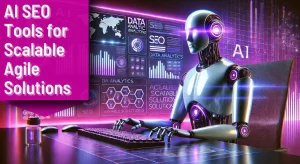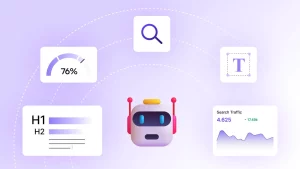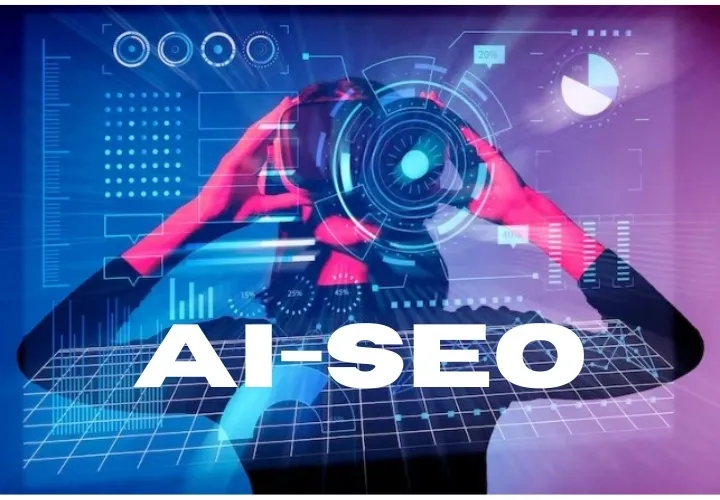Have you ever thought of how does personalization affect SEO? Here we have discussed 11 strategies for improving SEO performance with AI. The evolution of SEO is a continuous cycle and the inclusion of AI is an addition to it. According to SeoClarity, 86% of SEO experts have leveraged the power of AI to improve their SEO strategy. The reason for it is simple as a game changer, it is hard to avoid the importance of marketplace SEO intelligence. This is something you have to embrace wholeheartedly if you want to evolve constantly.
Forbes Advisor indicates that AI-powered tools are designed to save up to 50% of the time spent on data interpretation and analysis. This is why several businesses have improved their search engine optimization with marketplace SEO intelligence. Therefore, the impact of AI on SEO continues to grow daily, and those who realize it will gain a comprehensive advantage over those who do not.
According to Forbes Advisor, approximately 97% of business owners think that ChatGPT will help their business grow. Rather than automation and robots, AI is more about creating content, making smarter decision-making, and better data analysis. It helps in developing content that audiences can relate to. Therefore, to know about how does personalization affect SEO, here are 11 strategies for improving SEO performance with AI.
You may also like to read: Programmatic SEO A Guide to Automating Your SEO Strategy

-
Competitive Analysis for Future-Proof Business:
According to Traffic Think Tank, too many websites are created every day but the top 10 spots within search engines like Google and others do not change. Over time, the competition for SEO will become stronger than previously. Do you know who are your competitors and where they stand? By using AI tools you can analyze your keywords, rankings, and traffic. Thus, it will let you know about the things that are working fine vs. those that are not. To gain a competitive advantage, you need to think about how does personalization affect SEO. For this purpose, first, you have to consider the weaknesses and strengths to get started. Renowned tools such as Ahrefs and SEMrush are currently leveraging AI to provide market trends with deeper insights.
-
Turning Clicks into Clients with Optimization – Secrets to User Behavior
Do the customers leave your website without performing any action? By using AI to your advantage, you can track the behavior patterns of users and find out the areas that require improvement. For instance, using AI and SEO strategies together can suggest your targeted solutions. This will let you know the reason behind the users abandoning their cards on your e-commerce website. It will suggest a streamlined checkout process for boosting conversions and personalized recommendations to the customers. This is the way to know about how does personalization affect SEO.
-
Fix Technical Issues Fast with AI-Powered Error Detection:
Do you know how to use AI for SEO to fix technical issues? 404 errors, broken links, and slow load times are some of the common enemies that hurt SEO. By using AI, you can scan your website for technical issues continuously. For instance, you can ensure better search engine visibility and a smooth experience by letting AI detect errors on your product page. Once it is successfully detected, it will fix all the errors on the page quickly and improve visibility on the search engine. According to RaptorScan, broken links and 404 errors affect the user experience.
A Page Not Found message is nothing but a disaster for your website’s reputation in the perfect world of the Internet. To level up in the ranks that the search engine experience remains the same for everyone equally. The user may jump on to another similar bad site to get what they want. However, the Googlebot crawler will cast down the rating of the website after taking digital notes. Thus, it limits your chances of being discovered in the first place in Google SERPs. Running regular broken links with AI is important to ensure that the algorithms of Google are satisfied. So, know about the ways how does personalization affect SEO. This helps improve the overall performance and SEO website, you should use AI-powered backlinks service.
You may also like to read: How To Optimize Your Website For Local Search In Dubai

-
Using AI to Automate SEO Tasks
According to SEOMator, 37% of marketers make use of AI to allow for more focus on strategic initiatives, automate time-consuming SEO tasks, and improve efficiency. By using artificial intelligence in SEO to your advantage, you can avoid tasks from becoming repetitive. Thus, it allows for more strategic work by freeing up your time. A few practical applications include:
-
Generating faceted pages:
If you know how to use AI for SEO perfectly, you can prevent your eCommerce website from issues of duplicate content. This can be done by more effectively managing the dynamic pages. In some cases, duplicate content may affect search rankings. Such content impacts less than you may think on your search rankings. There are a host of factors involved when ranking, crawling, or indexing pages. Ensure valuable and unique content for building the reputation of the brand. If done right way then Google will rank and crawl your page higher as compared to duplicate pages.
Are you still concerned about the page ranking? Take advantage of social media channels to highlight your new post. With shares, clicks, likes, and links, your audience can help promote your page. Thus, it secures its deserving reach and visibility.
-
Identifying underperforming articles:
If the content does not have optimization, AI can flag it. Thus, it is easier to improve and refresh rankings. According to LinkedIn, 61% of marketers use artificial intelligence in SEO to improve SEO for underperforming articles. Furthermore, according to HubSpot, 68% of marketers have witnessed their ROI increase, once they started using AI. Forbes Advisor also indicates that 42% of businesses use AI for website copy as well as other long-form written content.
-
Image Alt text Optimization:
For improving search visibility and accessibility, AI can generate SEO-friendly alt-text and analyze images. In terms of SEO, image alt text is considered necessary for beneficial and accessible options. AI helps in overcoming the scenario when you have to write various images for the website. It takes too much time when you start doing it the human way. To identify images across the website with missing alt-text first use Screaming Frog. Once done then use BLIP to leverage image captioning with the help of AI. This automatically creates image text descriptions and to further refine, try ChatGPT for AI-generated captions. Once you have done it the right way then give these alt-text to developers to link them with suitable images.
-
Improving Image and Video Recognition:
Are you optimizing the visual content in SEO correctly? People share visual content on social media up to 4x times more compared to written text. Furthermore, the rate of engagement and shares is much higher. While a picture is worth a thousand words, multiply it by 10 in terms of video content. HubSpot reveals that brand recognition increases up to 95% with the help of video. And the popularity of marketing continues to boost. According to Lean Labs, 87% use their mobile devices daily, whereas 85% of all customers watch videos online at least once.
With AI-powered image recognition, you can engage customers with attractive visuals. For instance, if you have a travel blog, then AI may suggest including scenic landscapes. These have a better chance of performance as compared to generic shots of the city. This way you can get more appealing content through the guidance of AI.
The process of video recognition understands and analyzes the video content stream. Particularly, this process includes recognition, detection, and tracking activities, objects, and scenes. For computer vision, it is an important aspect that concerns with automatic visual data interpretation across the globe.
-
Remain on Top with Continuous SEO Monitoring:
By using AI, you can carry out SEO monitoring on a real-time basis. This helps in fixing problems and spotting trends, without letting your rankings get affected. For example, if you are running a website of news, and all of a sudden, a popular keyword drops in traffic. By using AI, you can recover quickly by analyzing the issue and suggesting adjustments.
-
AI-Driven Opportunities for Content and Keyword
To uncover new opportunities for content, take advantage of AI to analyze competitor strategies, search trends, and user behavior. For instance, if AI finds out “voice search optimization”, is a rising trend, you can create content on this topic before your competitors. This way you can stay ahead of the curve by smartly using AI to your advantage.
-
Boost Conversions with Smart Recommendations:
By focusing on tailored recommendations, AI can help to personalize user experience. For example, if a user views running shoes on your website, AI can indicate matching workout gear. Thus, additional purchases are likely to increase. Websites like Amazon personalize this procedure effectively and seamlessly with AI-driven recommendations.
-
Forecasting Changes in Search Algorithm:
There is a constant change in search engine algorithms, however, with AI you can stay up to date. With historical data analysis, AI can recommend and predict trends with protective adjustments to SEO. For example, if AI detects a mobile-first indexing shift, you can maintain your rankings by giving priority to mobile optimization.
-
Building Comprehensive SEO Dashboards:
Overtime SEO performance tracking for long-term success. With the help of AI, you can create advanced reporting dashboards consolidating over 16-month search console data. You can easily adjust your strategy, track trends, and measure improvements as required with clear visual insights.
-
AI for FAQ Optimization and Comment Marketing
In search engine optimization (SEO) user engagement is considered as most important. AI can analyze the commonly asked questions from the public and provide relevant answers for content optimization. By combining search terms that are used frequently in FAQs, blog comments, and review sections, you can boost your user experience and improve search visibility.
You may also like to read: SEO for Real Estate 7 Best Practices to Get More Organic Leads
Final Thoughts:
Previously perceived as just a buzzword, AI is no longer the same. Today, AI and SEO strategies combine to help achieve better results and help you make smarter choices. Thus, it is actively a part of improving user experience, optimizing content, and competition analysis. Therefore, to boost your digital game, you need to realize that the time for embracing AI-powered SEO is today.

